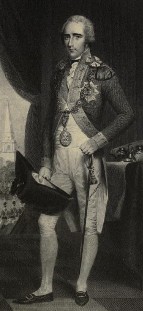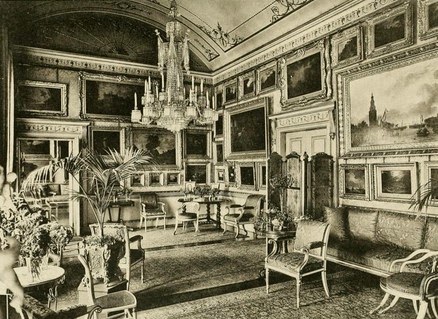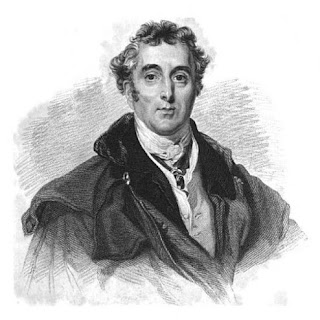 |
| Apsley House, London (2017) |
Apsley House is situated near Hyde Park Corner, London. It was the London residence of Arthur Wellesley, 1st Duke of Wellington, and was popularly known as No. 1 London because it was the first house to be reached after passing through the toll gate at Knightsbridge by people coming into London.
A family acquisition
 |
| Apsley House in 1800 from Old and New London by E Walford (1873) |
 |
| Richard, Marquess Wellesley from The History of White's by A Bourke (1892) |
A display home
After the Duke’s successes in the Napoleonic wars, and particularly at the Battle of Waterloo, many foreign heads of state honoured him with a variety of gifts which demonstrated the best workmanship of the time. The Duke wanted to display these treasures and had many cabinets specially made to house his magnificent collection. These still form the museum room in Apsley House.
 |
| Piccadilly Room, Apsley House, from Private Palaces of London by EB Chancellor (1908) |
Napoleon's statue and the porter's chair
In the entrance hall stands a black hooded chair, where the porter could sit all day, waiting in case he was needed to answer the door, shielded from draughts by the chair’s hood.
At the foot of the grand staircase is a huge marble statue of Napoleon by Canova.
The Waterloo Gallery
Wellington extended Apsley House, using Benjamin Wyatt as his architect. As part of the extensions, the Duke had a long gallery built on the first floor where he could display some of his art collection and hold balls – the Waterloo Gallery. It became the venue for the annual Waterloo Banquets from 1830, allowing him to invite more guests than before because of its grand dimensions.
No doubt influenced by the Hall of Mirrors at Versailles, the Waterloo Gallery was built with windows down the whole length of one side which had sliding mirror panels which could be drawn across them at night reflecting the candlelight back into the room.
 |
| Waterloo Gallery, Apsley House, from Private Palaces of London by EB Chancellor (1908) |
Night attack
Apsley House had its windows broken twice by rioters. On the first occasion, in April 1831, households had been called upon to light their windows to show their support of the Reform Bill, which Wellington opposed. Apsley House was dark because the Duke was away arranging the funeral of his wife, Kitty (née Pakenham), who had died on 24 April. Whilst her body still lay within its walls, the house was attacked by rioters who ruthlessly smashed its windows until a servant went up on the roof and fired a gun into the air to disperse the demonstrators.
After the attacks, the Duke had iron shutters fitted to his windows and it is thought that this gave rise to the popular nickname of the ‘Iron Duke’.
 |
| Arthur Wellesley, 1st Duke of Wellington, from Life of Field Marshal, his Grace the Duke of Wellington by JE Alexander (1840) |
Apsley House today
Apsley House and much of its contents were given to the nation by the seventh Duke and the house is currently maintained by English Heritage. It remains the residence of the Dukes of Wellington today.
Rachel Knowles writes clean/Christian Regency era romance and historical non-fiction. She has been sharing her research on this blog since 2011. Rachel lives in the beautiful Georgian seaside town of Weymouth, Dorset, on the south coast of England, with her husband, Andrew.
Find out more about Rachel's books and sign up for her newsletter here.If you have enjoyed this blog and want to encourage me and help me to keep making my research freely available, please buy me a virtual cup of coffee by clicking the button below.
Sources used include:
Alexander, James Edward, Life of Field Marshal, his Grace the Duke of Wellington (1840)
Gash, Norman, Wellesley, Arthur, 1st Duke of Wellington, (1769-1852), Oxford Dictionary of National Biography (Oxford University Press, 2004; online edn Jan 2011, accessed 2 Jul 2013)
Walford, Edward, Old and New London: A narrative of its history, its people, and its places (Cassell, Petter & Galpin, 1873, London) Vol 4
English Heritage audio tour of Apsley House
English Heritage webpage on Apsley House
Photographs © RegencyHistory.net |


A timely post in view of Robert Adam's birthday today (and he's the subject of my daily blog post too). I love the story about how Wellington acquired his "Iron Duke" nickname, I have told that one before to someone who refused to believe it!
ReplyDeleteHappy Birthday Robert Adam :)
DeleteI visited Apsley House and my first impression was how quiet it went when the front door shut. The heavy front doors really muffled out the sound of the traffic.
ReplyDeleteIt was an interesting place to visit but my feeling was that it was a very impersonal place - just my opinion!
I agree that Apsley House feels somewhat impersonal and think that this is because the rooms that are open to the public are very much the "show" rooms. Perhaps if we were able to see Wellington's personal space it would feel less like a museum and more like a home.
DeleteThe family still live in `Wellington's personal space,' per their agreement with English Heritage so it remains private. Just this year, they have begun including more personal items in cases in some of the rooms, which is a start in the right direction. I fear too many people find it impersonal, leaving with no clue to the man or his circle and no better informed than when they entered. It would be nice if they could rotate some holdings from Stratfield Saye to the house and put some period costumes, uniforms, etc. in the public rooms.
ReplyDeleteThanks for the great comment. I haven't been for a few years - I look forward to noticing the changes. :)
Delete